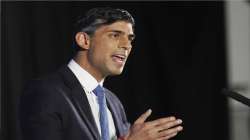No form of extremism acceptable in the UK: British PM Rishi Sunak on Khalistani issue
We are working closely with our partners in the Indian government to tackle the threat from pro-Khalistan extremism and the British police are fully empowered to deal with violent acts, said UK PM Rishi Sunak.

Allaying India's concerns over activities of pro-Khalistani elements in the UK, British Prime Minister Rishi Sunak asserted on Wednesday that no form of extremism is acceptable, adding that the right to hold lawful protest does not extend to violent or threatening behaviour.
In an exclusive interview to PTI, Sunak said he takes the duty of the government to disrupt and counter violent, divisive ideologies, whatever they may be, very seriously.
He said the UK is working closely with its partners in the Indian government to tackle the threat from pro-Khalistan extremism.
There have been increasing concerns in India about activities of pro-Khalistani elements in the UK, especially after an attack on the Indian High Commission in London in March.
Sunak's comments came days before he visits India to attend the G20 summit.
"No form of extremism is acceptable in the UK, and I take the duty of the government to disrupt and counter violent, divisive ideologies, whatever they may be, very seriously," he said.
"We are working closely with our partners in the Indian government to tackle the threat from pro-Khalistan extremism and the British police are fully empowered to deal with violent acts," he said, replying to a question on the issue.
There is a view in Delhi that the Khalistani issue is a stumbling block in deeper India-UK ties.
Sunak also referred to a meeting between External Affairs Minister S Jaishankar and UK's Security Minister Tom Tugendhat last month that was focused on addressing the threat of extremism and corruption.
"In August, the UK's Security Minister met Minister Jaishankar in New Delhi to develop our shared work addressing the threat of extremism and corruption," Sunak said.
"During that visit he announced new funding to enhance the UK’s capability to tackle pro-Khalistan extremism. The Rs 1 crore investment will strengthen our understanding of the threat posed by pro-Khalistan extremism and complement the joint work already underway between the UK and India," he said.
"UK citizens enjoy the right to gather lawfully and demonstrate a point of view, but rights to lawful protest do not extend to violent or threatening behaviour," the British prime minister said.
In March, India reacted angrily after pro-Khalistan elements attacked the Indian High Commission in London and pulled down the national flag from a pole at the front of the building.
The India-UK relationship was elevated to a Comprehensive Strategic Partnership during the India-UK virtual summit held between Prime Minister Narendra Modi and his then British counterpart Boris Johnson in May 2021.
At the summit, the two sides adopted a 10-year roadmap to expand ties in the key areas of trade and economy, defence and security, climate change and people-to-people connections among others.